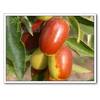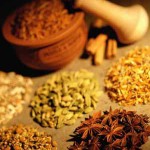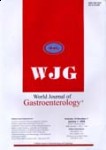 A slightly unusual yet inspiring story appeared on the front page of the LA Times today. It is about a farmer in California's Central Valley near Fresno who has been growing some unusual produce. He is growing one very common Chinese herb called Jujube fruit. This fruit is fetching higher than average produce market prices partly because the Asian community nearby understand the value of this Chinese date. It's the kind of success story I love reading about, so unusual for the front page of the LA Times.
A slightly unusual yet inspiring story appeared on the front page of the LA Times today. It is about a farmer in California's Central Valley near Fresno who has been growing some unusual produce. He is growing one very common Chinese herb called Jujube fruit. This fruit is fetching higher than average produce market prices partly because the Asian community nearby understand the value of this Chinese date. It's the kind of success story I love reading about, so unusual for the front page of the LA Times.
Used in many traditional Chinese herbal formulas, Da Zao as it's referred to in Mandarin, has several uses and is commonly added to improve the digestability of other herbs in formulas. Jujube is used in Traditional Chinese Medicine to improve digestion, improve energy and to nourish the blood. This is one reason you can find it in our Energy Booster Herb Pack.
It can be eaten right off the tree or dried and used in a tea, congee, (hot cereal) or used to sweeten rice or other foods. Jujube like many Chinese herbs doubles as both a food staple and a medicinal herb. In a higher dose this dried fruit is used for stress, nervousness and helps calm the spirit which is one of the reasons we included it in iSleep Herb Pack.
Most American's have never seen Jujube fruit but I have seen it popping up in Farmers Markets this time of year. This particular California farmer started growing it when he learned it was a popular item which could sell for a premium. Asian cultures have understood for centuries the value of this little date. In fact, the LA Times reported "his biggest-selling, most established crop is the super sweet jujubes." It seems Americans are starting to catch the wave, learning both the health benefits and tasty goodness available in botanicals we often use as herbal medicine.
It is truly great to see we are beginning to grow Chinese herbs here in California. Traditional Chinese herbs, whether they are being used for food or medicine have brought millions "Wellness for Centuries" and can continue to do so. Hopefully, one day soon more American's will understand these benefits.
Connect here to see our products containing jujube fruit: iSleep Herb Pack and our Energy Booster Herb Pack
See story here: http://www.latimes.com/news/local/la-me-hmong-farmer-20111114,0,5801613.story?page=2



 Menopause symptoms such as hot flashes, night sweats, irritability, brain fog and other symptoms seem to be considered the norm for women over the age of 50, yet this is not true for women around the globe. Researchers from the Department of Integrated Health at Westminster University polled 1,000 British women ages 45 to 55 and compared their answers to those of women from the U.S., Canada, Japan and China. The conclusion was that Japanese and Chinese women suffer the least amount of menopause symptoms. British women suffer the most and Americans are somewhere in between.
Menopause symptoms such as hot flashes, night sweats, irritability, brain fog and other symptoms seem to be considered the norm for women over the age of 50, yet this is not true for women around the globe. Researchers from the Department of Integrated Health at Westminster University polled 1,000 British women ages 45 to 55 and compared their answers to those of women from the U.S., Canada, Japan and China. The conclusion was that Japanese and Chinese women suffer the least amount of menopause symptoms. British women suffer the most and Americans are somewhere in between.


